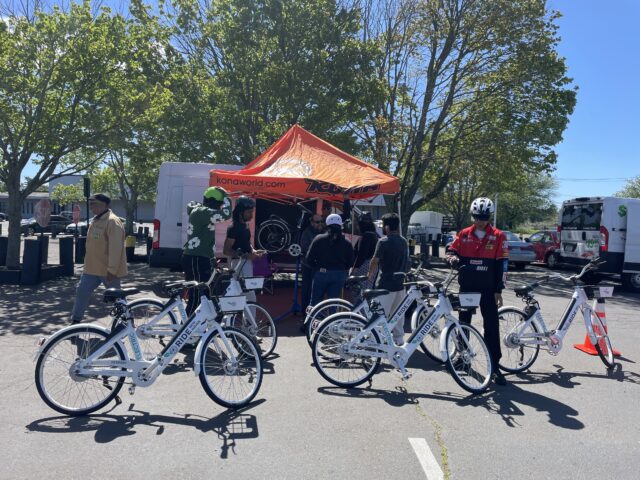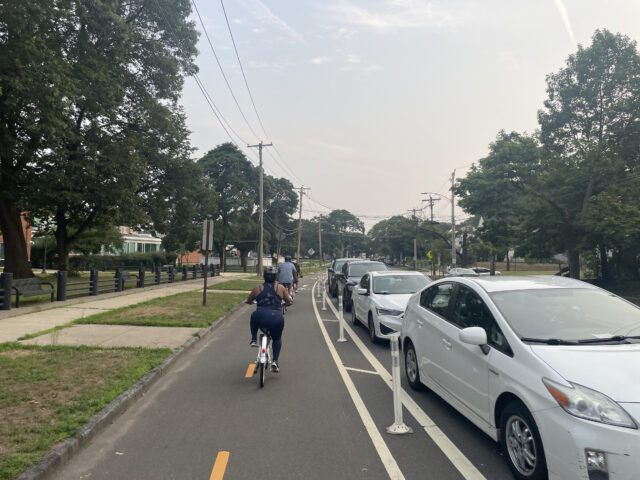Free Classes are Fueling New Haven’s Bike Share Revival
by Odochi Akwani, Writer and Content Manager
August 14, 2025
A series of free education classes is helping residents embrace the city’s newly relaunched bike share program.

When New Haven’s bike share program stopped in 2020, it left a multi-year gap in solidifying shared micromobility in the community. Now, with Ride New Haven, a new system featuring all-electric bikes, the challenge isn’t just about reintroducing the service, but reengaging the community. To bridge this gap, the New Haven Coalition for Active Transportation (NCAT) launched free educational classes. These sessions teach residents how to use the app, safely handle the new e-bikes, and build confidence.
With the relaunch of bike share in the community, NCAT looked for ways to provide community education and engagement around the system. When the Better Bike Share Partnership announced the latest mini-grant round earlier this year, NCAT saw this as an opportunity to do just that, focusing on making bike share more accessible and user-friendly through bike education classes.
“I think there can be some technical hurdles to using an app to unlock bikes,” says Elias Estabrook, director of education at the New Haven Coalition for Active Transportation. “The signage in New Haven has room for improvement, so there’s a lack of clarity around how to use the system if you just walk up to a station.”
Since May, NCAT has hosted several bike share education classes in partnership with Ride New Haven. They partnered with the New Haven Adult and Continuing Education Center for their adult ed’s multicultural festival bike rodeo. Students in the English for Speakers of Other Languages (ESOL) program learned about Ride New Haven and heard from Devil’s Gear, a local shop which does the bike share system’s maintenance. Then, students got to test out the bikes by riding around a beginner-friendly cone course.
NCAT continues these efforts with bike share skills classes at various libraries and recreation centers in New Haven to enhance participants’ skills and confidence in using Ride New Haven throughout the summer and into the fall. These two-hour sessions teach attendees how to set up and use the app, followed by a discussion on electric bicycles. Since the system is fully electric, participants often have questions about riding e-bikes. The discussion covers safety considerations, potential challenges at higher speeds, acceleration and braking, handling heavier devices, and the advantages of electric bicycles. A major benefit of taking a class is that the first 50 qualifying residents to participate receive a free one-year membership to Ride New Haven.
The group ride takes participants on a one-to-two-mile route around the neighborhood near the library or recreation center. Michael Twitty, a certified League Cycling Instructor by the League of American Bicyclists, is one of the class instructors. He’s been teaching cycling for about three years and leads a local bike group called Black and Brown Soul Cyclists.

Twitty has heard from participants about the positive impact bike share has had on their lives for both recreation and transportation. One woman shared with him that she was excited to learn about e-bikes so she could ride alongside her two kids.
“One person now says he can go to work instead of taking two buses; he can use the bike to get to and from work,” says Twitty.
According to Estabrook, New Haven is currently filling in gaps in active transportation infrastructure since its Safe Routes For All plan was passed in 2022. The plan is currently in “Phase 2: The Active Transportation Plan,” which prioritizes New Haven’s communities of color in enhancing street safety for active transportation, including walking, biking, and taking the bus.
“I hope that class participants become regular users of the bike share system and really get to experience the more long-term benefits of convenient access to mobility, health, and wellness,” says Estabrook.
________________________________________________________________________________________
The Better Bike Share Partnership is funded by The JPB Foundation as a collaboration between the City of Philadelphia, the National Association of City Transportation Officials (NACTO), and the PeopleForBikes Foundation to build equitable and replicable bike share systems. Follow us on LinkedIn, Facebook, Twitter, and Instagram, or sign up for our weekly newsletter.
Have a question or a story idea? Email odochi@peopleforbikes.org.
